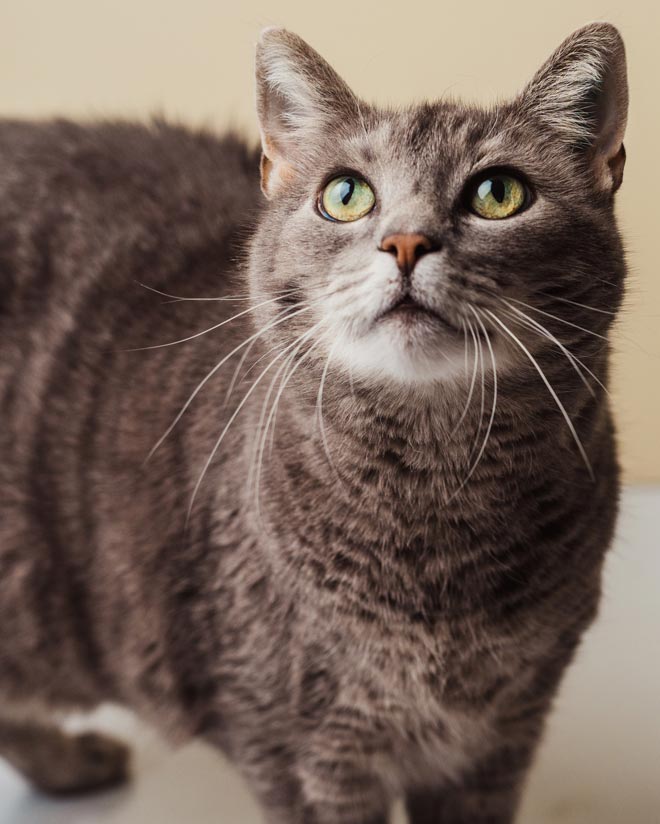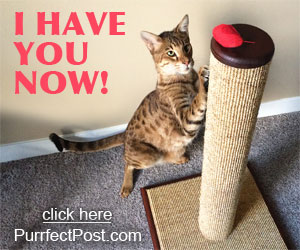Pampering Senior Cats

Your cat has finally reached the golden years. And you don’t know whether you should be doing anything different. Sound familiar?
You have joined the increasing number of Americans dealing with senior cats. A huge shift to advanced aged cats has occurred over the last decade. The shift has occurred because of increased knowledge of senior cats' needs, excellent veterinary care, indoor cat lifestyles, and the will of owners to invest in preventive medicine so that many typical senior degenerative conditions are held at bay.
Let us walk you through some great suggestions for pampering cats in their golden years:
Frequent Vet Visits
As cats age, we need to increase the frequency of routine health care visits to at least twice a year. For every year we age, our feline companions age about 5-6 years, so for them, a year is a long time in their lifespan. Your veterinarian will design an intelligent plan, customized for your cat, to help identify and treat conditions we commonly associate with aging.
Decrease Stress
Stress can have a negative impact on a cat's immune system, leading to increased vulnerability to illness. Chronic severe stress can actually hasten aging.
Some tips to keep stress down include:
- Keep household noise levels down
- Protect from overzealous children or rambunctious puppies
- Provide a safe quiet haven for rest
- Feed a high-quality food designed to meet the special nutritional needs of senior cats and offer plenty of fresh water
- Increase the number of boxes in the house to allow easy access to Kitty’s toilet—stairs may be a strain on the old bones, so place one on each level of a multi-story home
You can learn more here: "Stress in Cats."
Stick to a Routine
Cats appreciate routine, and as they get older, they feel safer and happier if a steady routine is set. The sharpness of their special senses may become reduced. Decreased hearing and vision and cognitive dysfunction commonly occur. These changes may make them feel insecure. A solid routine can help provide a sense of security, and decrease stress. For example, an important aspect of a daily routine is that feeding time occurs at the same times every day.
Massage
Old, achy joints will benefit from a light massage. Massage helps loosen the stiffness in the muscles and joints, increases circulation, and provides the close “people contact” that appears to soothe old kitties. During massage, new lumps or bumps can also be picked up and the veterinarian notified. Skin lumps, or in the female, mammary gland lumps are especially important to check for.
Grooming
Your kitty may not be able to groom herself as well as she ages and will appreciate some help here. Her increasing spine stiffness and/or any obesity may result in loss of ability to groom around the rear end especially. Regular brushing has the benefit of removing dead hair from the coat and this can decrease hairball formation. Cats normally spend up to 1/3 of their waking time grooming, so by removing a fair bit of the dead hair, you are making less work for your kitty and leaving more time for her to rest. Note that the skin may be more sensitive in an older cat, so take care to use a soft brush. Check the ears for waxy secretions and remove with a cotton ball if needed.
Claws need more frequent trimming in the senior cat because the nail sheaths may not fall off as easily during scratching and may build up around the nail. Claws are also more brittle in senior cats, so they are more likely to break off. Cats’ claws grow in a curved manner, and if they aren’t kept short by scratching or trimming, they can grow too long and curl underneath the paw pad or even grow into the pad, causing discomfort. Senior cats may not use the scratching post as much due to arthritis or just because of reduced general activity, so claw care needs to be done every few weeks.
Avoid bathing a geriatric cat unless prescribed by the veterinarian or if some soiling needs to be removed (such as feces or urine caught in the fur) because most cats find a bath quite stressful. If bathing is required, offer a secure footing in the bath so that the kitty will not slip. Make sure she is not allowed to become chilled.
Food, Supplements, and Water
Offer a senior cat formulation—switching over very gradually from a regular adult maintenance diet at around 7-9 years of age. If there are any chronic conditions, your veterinarian may prescribe a special prescription diet. Discuss possible nutritional supplements with your veterinarian before starting to offer them. Enzymes, probiotics, antioxidants, and fatty acids may be of benefit but remember—you can give too much of a good thing, so consult with your veterinarian regarding cat-appropriate doses.
Provide fresh filtered water daily. A consistent source of water is important since different water sources have different subtle flavor differences, and your cat may reject a water source unfamiliar to her. To help prevent urinary tract stones, it is essential to keep water intake high.
Monitor food and water intake and note any changes. To monitor water intake, at the start of the day, offer a set volume of water, then measure what is left when you change the water next. Subtract, and you will be able to keep an accurate record of water intake. Use the same process for the food. This provides a good early detection system for any potential problems and lets your veterinarian know what the normal intake levels are for your cat and whether these fall within the expected normal range. Notify your veterinarian of any increase or decrease in food or water consumption because this can indicate internal or dental problems etc.
Exercise
Just as exercise is good for us as we age, it is important for your cat to have moderate daily exercise too. But they won’t be able to play as vigorously as when they were a kitten so design short play sessions. Often, a favorite toy can be a stimulus for a chase. Senses may be diminished, so a different toy might be preferred by a senior, compared with a kitten.
Litter Box
Clean the box daily, and note bowel movements and urine production. Discuss any changes with your veterinarian. Provide one on each floor of your home so your cat does not have to climb or descend stairs to reach the box. For a stiff geriatric cat, provide a box with very low sides so that it is easy to get in and out of. Arthritis may prevent access to some boxes. Make sure the boxes are in quiet locations so she feels safe.
Indoors
The indoor lifestyle is safer for cats. It provides low stress, freedom from temperature extremes and poor footing, and predators. Arthritis and decreased vision and hearing make a kitty much more prone to getting hit by cars or attacked by other cats, dogs, or wild animals as she ages. Indoor cats also have protection from exposure to transmissible diseases and parasites. The senior cat has a less efficient immune system and so is more susceptible to disease and tends not to fight off infection as well.
Accessibility
As the cat becomes geriatric, she may not be able to jump to high places as well or maneuver through her old favorite kitty condo. Consider adding ramps or stairs so she can reach a favored sleeping spot. If she has trouble getting up onto a couch or chair, consider dedicating a pillow to provide a “step up” on the floor next to the furniture.
Soft Bedding
Cats normally sleep a lot. To help with those achy bones and address the thinner average body condition of senior cats, provide a well cushioned sleeping spot. Older cats tend to sleep more, so a lot of time will be spent here. Provide a quiet place to sleep.
Scratching Post
If arthritis is preventing your cat from getting a good scratch from a vertical post, then consider a horizontal or angled product such as the corrugated cardboard scratch posts. These provide easy access for claw conditioning.
Dental Care
Discuss regular home dental care for your senior cat with your veterinarian. Tooth brushing or dental rinses or treats can help keep the teeth and gums healthy. And have regular dental check-ups done with the veterinarian. Almost every senior cat has some degree of dental disease.
As you can see, there are a number of really helpful strategies you can use to help keep your senior cat comfortable.
You May Also Like These Articles:
Feline Senility: Cognitive Disorder in Cats
Giving Your Cat Clean and Fresh Water
Notice: Ask-a-Vet is an affiliated service for those who wish to speak with a veterinary professional about their pet's specific condition. Initially, a bot will ask questions to determine the general nature of your concern. Then, you will be transferred to a human. There is a charge for the service if you choose to connect to a veterinarian. Ask-a-Vet is not manned by the staff or owners of CatHealth.com, and the advice given should not delay or replace a visit to your veterinarian.





